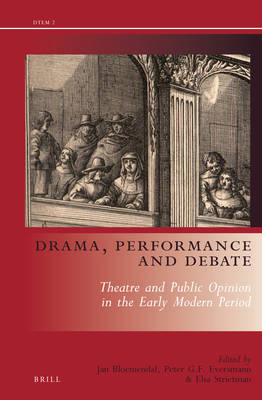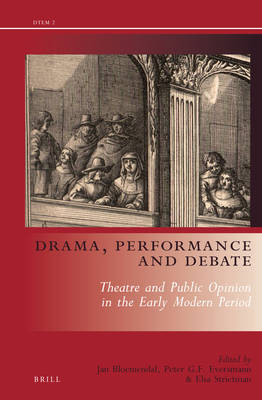
Je cadeautjes zeker op tijd in huis hebben voor de feestdagen? Kom langs in onze winkels en vind het perfecte geschenk!
- Afhalen na 1 uur in een winkel met voorraad
- Gratis thuislevering in België vanaf € 30
- Ruim aanbod met 7 miljoen producten
Je cadeautjes zeker op tijd in huis hebben voor de feestdagen? Kom langs in onze winkels en vind het perfecte geschenk!
- Afhalen na 1 uur in een winkel met voorraad
- Gratis thuislevering in België vanaf € 30
- Ruim aanbod met 7 miljoen producten
Zoeken
Drama, Performance and Debate
Theatre and Public Opinion in the Early Modern Period
€ 331,45
+ 662 punten
Omschrijving
Early modern theatre was a visual matter, even though the authors wrote plays which were mainly meant to be read. But whether they wrote their plays to have them performed or not, authors could use comedies, tragi-comedies or tragedies to influence public opinion, to make a statement in a debate, or to convey explicit or implicit lessons that they carried out or had carried out by linguistic, rhetorical and theatrical means. How explicit they were in expressing their views depended on the characters of the authors or the circumstances in which they wrote. Questions regarding the opinion-forming and opinion-following functions of theatre, the means by which authors and theatre makers expressed their ideas, and the role of theatre and plays in public debate are discussed from various angles. Such questions refer not only to 'literary' plays, but also to other forms of theatrical event, such as royal entrances.
Contributors include: Imre Bésanger, Hartmut Beyer, Stijn Bussels, Jean-Frédéric Chevalier, Verena Demoed, Arjan van Dixhoorn, Ron Gruijters, Jelle Koopmans, Frans-Willem Korsten, Katell Lavéant, Hubert Meeus, Marco Prandoni, and Helmar Schramm.
Contributors include: Imre Bésanger, Hartmut Beyer, Stijn Bussels, Jean-Frédéric Chevalier, Verena Demoed, Arjan van Dixhoorn, Ron Gruijters, Jelle Koopmans, Frans-Willem Korsten, Katell Lavéant, Hubert Meeus, Marco Prandoni, and Helmar Schramm.
Specificaties
Betrokkenen
- Uitgeverij:
Inhoud
- Aantal bladzijden:
- 382
- Taal:
- Engels
- Reeks:
- Reeksnummer:
- nr. 2
Eigenschappen
- Productcode (EAN):
- 9789004240636
- Verschijningsdatum:
- 31/10/2012
- Uitvoering:
- Hardcover
- Formaat:
- Genaaid
- Afmetingen:
- 163 mm x 241 mm
- Gewicht:
- 725 g

Alleen bij Standaard Boekhandel
+ 662 punten op je klantenkaart van Standaard Boekhandel
Beoordelingen
We publiceren alleen reviews die voldoen aan de voorwaarden voor reviews. Bekijk onze voorwaarden voor reviews.








